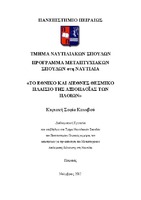Το εθνικό και διεθνές θεσμικό πλαίσιο της αξιοπλοΐας των πλοίων

Master Thesis
Συγγραφέας
Καναβού, Σοφία - Κυριακή Θ.
Ημερομηνία
2013-06-07Επιβλέπων
Σαμιώτης, ΓεώργιοςΠροβολή/
Θεματική επικεφαλίδα
Πλοία -- Κανονισμοί ασφαλείας ; Ναυτιλία -- Δίκαιο και νομοθεσία ; Νηολόγια ; Σημαία πλοίου ; Human factors -- ShippingΠερίληψη
Το 90% του παγκόσμιου εμπορίου διακινείται μέσω θαλάσσης. Με σκοπό να διασφαλίσουμε λοιπόν ότι η ναυτιλιακή βιομηχανία λειτουργεί καταλλήλως, είναι σημαντικό να είναι σωστά θεσμοθετημένη και να συμβαδίζει με τις εξελίξεις του παγκόσμιου εμπορίου. Είναι σ' αυτό το σημείο που τίθεται το ζήτημα της αξιοπλοΐας των πλοίων, της κατάστασης δηλαδή στην οποία βρίσκεται ένα πλοίο ώστε να μπορεί να κάνει ασφαλείς πλόες. Ο όρος αυτό περιλαμβάνει τη φυσική αξιοπλοΐα, την ανθρώπινη αξιοπλοΐα και την αξιοπλοΐα σε σχέση με τα έγγραφα, αναφορικά με την αξιοπλοΐα του πλοίου. Είναι σημαντική όμως και η καταλληλότητα του πλοίου σε σχέση με το φορτίο, προκειμένου να το μεταφέρει με ασφάλεια. Υπάρχει φυσικά ένα ολόκληρο θεσμικό πλαίσιο το οποίο θα πρέπει να τηρείται ώστε να προάγεται η έννοια αυτή. Υπάρχουν τρεις βασικοί φορείς που προσδιορίζουν την καταλληλότητα των πλοίων μέσω διαφόρων ειδών επιθεωρήσεων. Πρώτα απ' όλα, το Κράτος - Σημαία, που είναι ουσιαστικά το κράτος κάτω απ' τους νόμους του οποίου είναι εγγεγραμμένο ένα πλοίο, ο Νηογνώμονας, ο οποίος είναι ένας Μη Κυβερνητικός Οργανισμός που θέτει κάποιες τεχνικές προδιαγραφές για την κατασκευή και τη λειτουργία των πλοίων, αλλά και το πιο βασικό απ' όλα, ο Κρατικός Έλεγχος Λιμένων, μέσω του οποίου τα ξένα πλοία επιθεωρούνται σε άλλα λιμάνια με σκοπό την εξακρίβωση της συμμόρφωσης τους με τις διεθνείς θαλάσσιες συμβάσεις από άποψη ασφάλειας, κατασκευής, διαχείρισης και εξοπλισμού λειτουργεί σαν ένα τελευταίο δίχτυ ασφαλείας μετά το Κράτος - Σημαία και το Νηογνώμονα. Βέβαια, παρά την ύπαρξη ενός ολόκληρου συστήματος που μεριμνά και προάγει την αξιοπλοΐα, φαίνεται πως η εφαρμογή της τελικά δεν είναι αυτονόητη.


